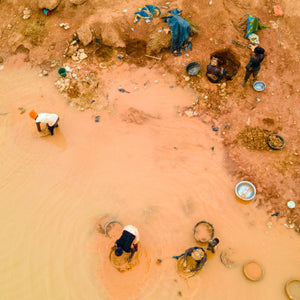The Main Causes of Water Pollution in Africa
Water is undoubtedly one of the world's most precious, yet most overlooked resources. In Africa, it is even more important given its scarcity and also the role that water plays in sustaining day to day life across the continent. Unfortunately, despite being so essential, Africa’s waters are regularly subject to degradation through pollution - largely as a result of human activities.
Polluted water can have devastating effects on both human and aquatic life, and it may lead to life-threatening diseases like cholera, typhoid and dysentery. Sadly, around 115 people in sub-Saharan Africa die every hour from diseases linked to improper hygiene, poor sanitation and contaminated water.
We explore some of the main causes of water pollution in Africa, as well as ways we can help prevent it.
Agricultural pollution

Agriculture continues to play an essential role in many Africans’ lives. In sub-Saharan Africa, for example, more than 60% of the population are smallholder farmers. However, this industry can have a hugely negative environmental impact that needs to be addressed.
Runoff from fertilizers, pesticides and herbicides is one main cause of water pollution in Africa. These chemicals contaminate the water supply, killing aquatic creatures and disrupting delicate ecosystems. Agricultural runoff can also cause long-term damage to human health, as these chemicals can persist in the environment, leading to the accumulation of toxins in the food chain.
The solution to this agricultural pollution is the promotion and adoption of more sustainable farming practices that reduce the negative impacts of agricultural runoff.
Industrial pollution
Industrial activities like mining and manufacturing play a crucial role in economic development, but they are also one of the main causes of water pollution in Africa. This is because many industries release untreated or inadequately treated wastewater containing harmful chemicals, heavy metals and other pollutants into bodies of water.
Lagos in Nigeria, for example, generates 1.5 million square meters of domestic, agricultural and industrial wastewater every day, and most of it ends up untreated in the Lagos Lagoon.
This industrial waste not only affects aquatic life but also poses risks to human health through the consumption of contaminated water. The most effective way to tackle this pressing issue is for governments to implement and enforce stricter industrial waste disposal regulations.
Domestic wastewater disposal

Rapid urbanization and population growth in various African cities has led to increased sewage and waste generation. However, many of those cities do not have the sanitation and waste management infrastructure to manage it. The result is that untreated sewage water is discharged into lakes, rivers and seas, contributing to the continent’s water pollution.
Sewage contains harmful pathogens that can spread disease and pollutants that can lead to toxic algal blooms, killing off marine life and harming humans who come into contact with contaminated water. Proper sewage treatment is crucial to preserving the health and vitality of Africa’s precious water resources.
Oil spills

The devastating impact of oil spills from offshore drilling and tanker accidents cannot be overstated. These environmental disasters can have far-reaching consequences for marine life, coastal communities and even the global economy, which is why they are one of the main causes of water pollution in Africa.
Oil spills and leaks happen as a result of oil exploration, production and transportation in African countries. They pose a serious threat to the delicate balance of our marine ecosystems, destroying habitats and disrupting the food chain. When an oil spill occurs, it can take years for the affected area to recover fully.
In 2022, Nigeria’s National Oil Spill Detection and Response Agency (NOSDRA) reported a total of 592 oil spills, spewing an estimated 18,925 barrels of oil into inland and offshore waters. The impact of these spills is great, with those who depend on farming and fishing experiencing a direct impact on their livelihoods.
While measures are already being taken to prevent such incidents, the unfortunate truth is that there is no foolproof method to entirely eliminate the risk of oil spills. It is a sobering reminder of the need for responsible and sustainable practices in the oil and gas industry.
The main causes of water pollution in Africa
These are a wide range of factors that cause water pollution in Africa. We have discussed the key contributors, but other factors also include deforestation, soil erosion and climate change.
Water pollution in Africa deeply impacts millions of people across the continent. To tackle it, solutions need to be implemented at every level; from grassroots initiatives like local cleanups and increasing public awareness, to governmental regulation that enforces environmental laws to protect those who may not have a voice.
With collective and sustained efforts from individuals, organizations and governments, there is hope of lessening the devastating effects of water pollution in Africa.


